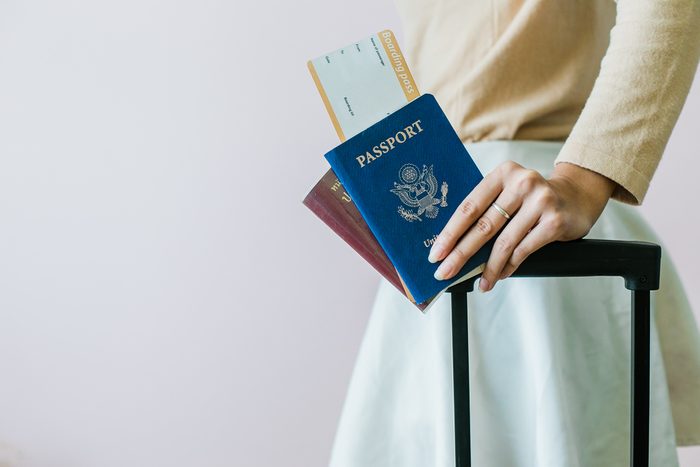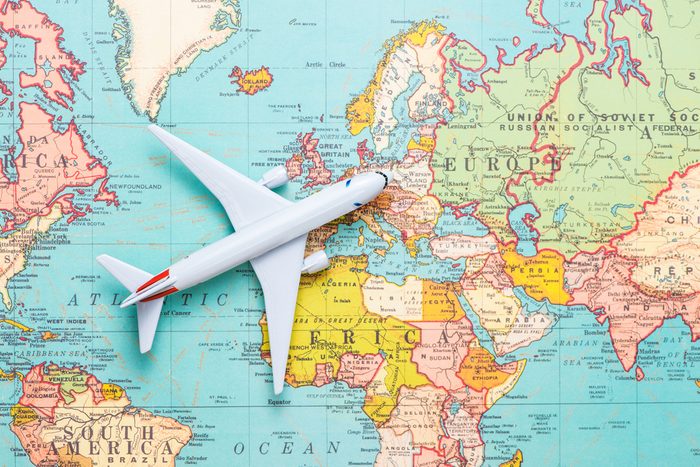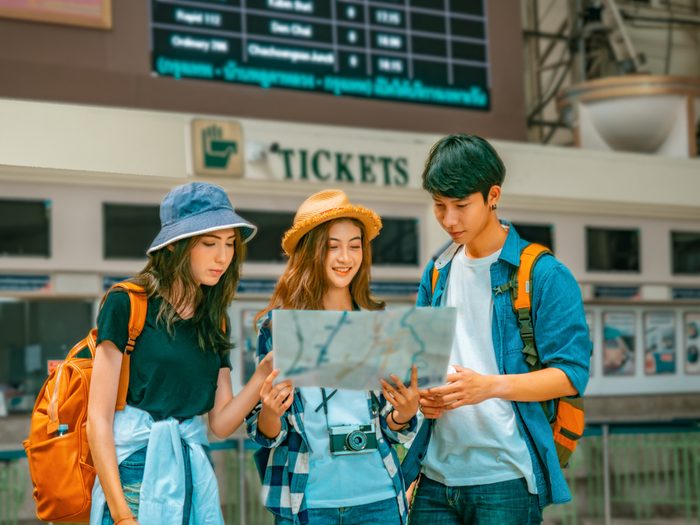
Make a plan before you leave
While travel blogger Nate Hake used to make day-by-day itineraries before he left for vacation, he now recommends a more spontaneous approach to jet setting. This might be a tad more nerve-wracking, but Hake says having every-little-detail mapped out can stand in the way of more memorable experiences. “After enough time, you start to learn that the best experiences are unplanned. From making a group of Russian friends in the self-proclaimed nation of Abkhazia to spontaneously renting a campervan and driving around Tasmania, my favorite memories were rarely something I expected beforehand,” he shares. Be spontaneous, but still safe: Make sure to follow these safety tips for smart travel, especially when alone.

Don’t talk to strangers
Sure, your mom might have told you to be wary of strangers—especially in a place with a language you don’t speak—but take those words of wisdom with a grain of salt. As Hilary Welter, digital nomad for NRHA, explains, locals can often be your greatest resource. Trust your gut and be mindful of who you decide to strike up a conversation with, but don’t be afraid. “Becoming friendly with a local is a sure way to see some awesome off-the-beaten-path places that you wouldn’t have found otherwise,” Welter explains. “There are plenty of kind locals who are happy to show off their home city to tourists.”

Carry your passport with you at all times
Especially if you’re new to crossing the Atlantic, your passport might feel like a prized, often scary, possession to have with you. While it is your most important document, Suzanne Wolko, travel blogger, advises against always carrying it while you’re traveling. “I take a photo of my passport and keep it in my email ‘drafts’ folder so I can access it if needed,” she explains. “When shopping and filling out tax reclaim forms, I’ve used the photo in stores without an issue.” Here are some more packing tips that’ll make your next trip way easier.

Avoid certain countries if you’re an American, solo—and so on
Though, sure, it is important to do a bit of research on your intended destination’s travel advisories (the U.S. State Department’s website is a smart place to begin), traveler and author Kelly Hayes-Raitt says not to discount a place based on hearsay. In other words, what makes the news is often the exception, not the rule. “Bombings, frequent muggings, and other violence are usually contained to a specific area, which doesn’t necessarily mean the whole city or country is inherently unsafe,” she continues. “Be smart, stay aware, use your instincts, and don’t let others’ fear dissuade you.” In fact, these 13 “dangerous” countries are safer than you might think.

Only Airbnb gives you the local experience
While Airbnb offers a unique experience for many, Brooke Siem, digital nomadic writer and chef, recommends thinking twice about always picking this route, as it could impact the local community. “Many residents are getting forced out of their homes by landlords who see a money-making opportunity in tourists who want to stay in the ‘heart’ of an area, be it Venice, Lake Tahoe, or Cuba,” she continues. “Consider a boutique bed & breakfast or homestay instead, which provide a local, homey experience and contribute to the local economy.”

You have to quit your job if you want to travel long-term
As the growing digital nomad community is proving, the definition of work is fluid. Getting a long-term trip approved might just take a bit of convincing. “Remote work is on the rise—and by explaining how you can be productive anywhere, not just in your cubicle, you might be able to make the shift,” explains Jess Tatham, digital nomad and location-independent web developer. If your manager declines your request, there are plenty of companies who operate with fully remote workers. Or, if you’re ready for the freelance route, take a line out of Tatham’s resumé and branch out on your own.
European cities are too expensive
Always wanted to see the view from the top of the Eiffel Tower, or stroll through the promenade of Rome? While these top spots usually get a bad rap for being out of everyone’s price range, Hayes-Raitt reminds that there is a budget-friendly solution for nearly every locale. Instead of thinking your dream trip is out of the question, get creative. Some of her favorite money-saving tips: “I buy museum cards that allow me to visit a variety of museums at a discount. I eat at food markets, and I walk or take public transportation rather than rent a car. And I use Groupon discount coupons for dining out and for entertainment.” All of these methods paired together can save you hundreds, possibly thousands, of dollars.

Don’t eat the street food
Many health pros might recommend travelers stay clear of the street food, but Siem says that’s a huge missed opportunity. Instead of fully cutting it out of your away-from-home diet, Siem says just to proceed with caution to keep your tummy tamed while enjoying local delicacies. “Look for crowded stands in popular locations, where turnover is high. Start with a small meal with low spice to see how you do. Stick to veggies that are peeled and meat that looks bright and fresh, and avoid any stands that smell strongly of old oil,” she explains. Follow these 15 other tips to stay healthy while on vacation.

You shouldn’t travel solo
Exploring new terrains all by yourself is becoming more and more popular, but that doesn’t prevent naysayers (like your parents) from warning against it. As long as you are smart and careful—as you should be at home and away—traveling solo isn’t as scary as it is often perceived. “You can travel solo by joining a tour group, going solo to a yoga or surf retreat, or going independent and traveling completely on your own,” Wolko explains. Next, check out these other common travel tips that are no longer true.
